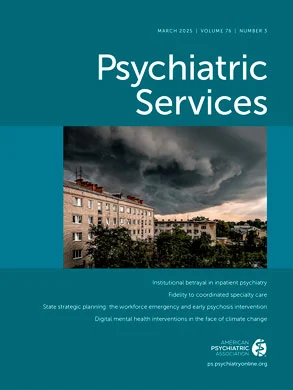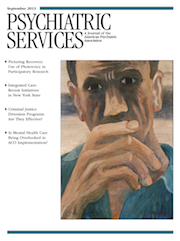To the Editor: Medication nonadherence is a significant issue for patients with diabetes and serious mental illness (
1). Determining the causes of nonadherence is challenging. In a study of veterans with schizophrenia, adjusted analyses found that adherence to medication for a comorbid general medical condition was worse than adherence to antipsychotic medication (
2). In this study, we explored whether adherence to diabetes medications is correlated with adherence to psychiatric medications among veterans with comorbid diabetes and serious mental illness.
We analyzed 2008–2011 pharmacy data for 319 veterans with diagnoses of both diabetes and serious mental illness (defined as bipolar disorder or schizophrenia). For one year before each patient’s study enrollment, we calculated the medication possession ratio (MPR)—that is, the percentage of days during the study year on which filled prescriptions were available for all hypoglycemic medications and for all psychiatric medications (antipsychotics and mood stabilizers).
The mean MPR for psychiatric medications was 72%, compared with 79% for hypoglycemic medications. A modest linear correlation was observed between MPR rates for psychiatric and hypoglycemic medications (Pearson correlation coefficient, r=.26, p<.001). A scatterplot showed clustering effects at high and low MPR levels, but otherwise there was substantial discordance in rates of adherence between the medication classes. Among the 173 patients with good adherence to psychiatric medication (defined as an MPR ≥80%), 73% (N=126) had good adherence to hypoglycemic medication. Among the 200 patients with good adherence to hypoglycemic medication, 63% (N=126) had good adherence to psychiatric medication. Among the 119 patients with poor adherence to hypoglycemic medications (defined as an MPR <80%), 60% (N=72) had poor adherence to psychiatric medication. Among the 146 patients with poor adherence to psychiatric medication, 49% (N=72) had poor adherence to hypoglycemic medication (p<.001 for all).
Only 126 of the 319 patients (39%) were adherent to both classes of medication, which is consistent with previous research (
2). No data were available on patients’ reasons for adherence or nonadherence to either type of medication. A previous study found that nonadherence to psychiatric medication was influenced by perceptions of stigma (
3). However, if stigma was a major driving force behind nonadherence to psychiatric medication in this study, we would have observed much higher average MPRs for hypoglycemic medication than for psychiatric medication; however, the rates were about equal.
The relative lack of association between adherence to the two medication classes indicates that the drivers of nonadherence probably differed by patient and medication class. Thus it is likely that interventions to improve adherence should be specific to medication class and pattern of adherence. Qualitative work with patients with different patterns of adherence to various medications and medication classes would provide greater insight into motivators of adherence to complex medication regimens and potential avenues for intervention. Such avenues will likely need to be tailored to the unique barriers to adherence faced by an individual patient.
Acknowledgments and disclosures
This project was awarded to Judith A. Long, M.D., principal investigator, and to Steven C. Marcus, Ph.D., coinvestigator. The authors thank them for their review and assistance. This work was supported by grant IIR-07-124, which was funded by the Office of Research and Development and Health Services Research and Development, Veterans Health Administration, U.S. Department of Veteran Affairs.
The authors report no competing interests.

